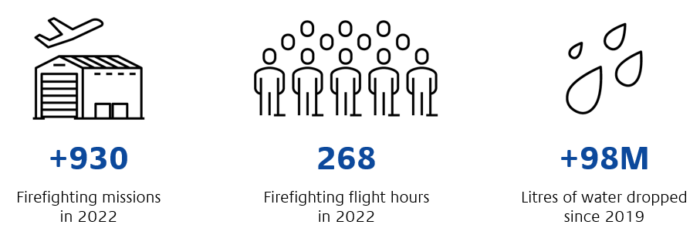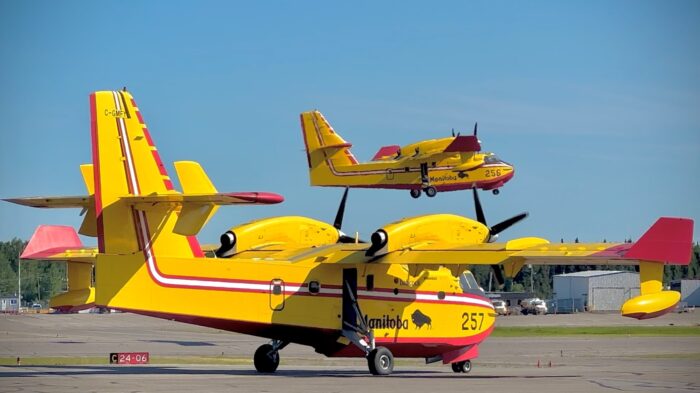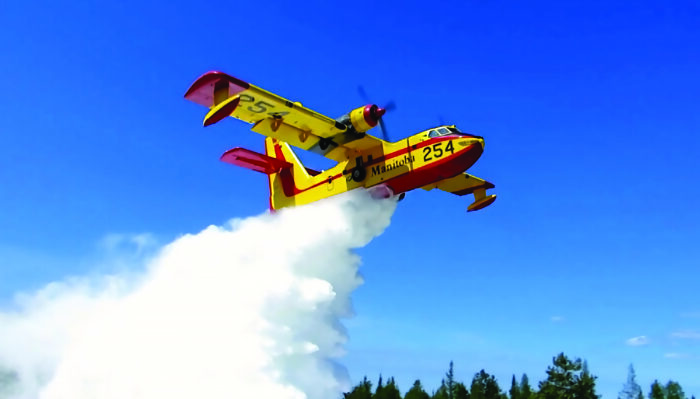In 2019, Babcock Canada was awarded a 10-year contract for aerial wildfire suppression services by the Government of Manitoba. Since then, Babcock has managed, maintained, and operated Manitoba’s fleet of seven amphibious water bomber aircraft and three Babcock-owned 690 Twin Commander “bird-dog” aircraft.
As a leader in aerial firefighting in Canada, Babcock provides a full range of firefighting services from customizable services to fully integrated turn-key solutions. Babcock Canada draws on global experience to deliver fully integrated solutions tailored specifically for Canada and its unique environment.

Canada has surpassed its record for the largest area burned by wildfires in a single year. Our teams of Aircraft Maintenance Engineers (AMEs) and dedicated support staff in Manitoba are hard at work during this unprecedented wildfire season and our crews have been keeping busy to support not only Manitobans but also neighboring provinces.
To learn more about what a fire season entails for our teams, we sat down with Babcock’s Operations Delivery Manager, Scott McAllister. Scott has been with Babcock since 2018 and is responsible for the operations and service delivery.
Within Manitoba, Babcock operates out of three bases in addition to Winnipeg: Gimli, The Pas, and Thompson. When supporting a fire in these areas, our crews and aircraft are dispatched. However, there are scenarios where provinces across Canada may need additional support, in this case our crews and aircraft can be deployed to support them.
“When provinces require extra support, they will put a notice in through the Canadian Interagency Forest Fire Center (CIFFCI). CIFFCI is a not-for-profit corporation owned and operated by the federal, provincial, and territorial wildland fire management agencies to coordinate resource sharing, mutual aid, and information sharing. CIFFCI will then reach out to different agencies and determine which provinces can provide support. However, if aircraft are deployed to other provinces and weather and/or conditions change back home, they will pull back the aircraft and crews in order to return home and protect their home-province,” McAllister explained.

So far this season, our teams have been dispatched to 84 missions within Manitoba and have been deployed twice out-of-province. In May, Babcock supported wildfire suppression efforts in Lac Labiche, Alberta, and in June supported firefighting efforts in Dryden, Ontario. For each deployment, Babcock sent two CL-415 water-bombers, one “bird-dog”, five pilots, two aircraft maintenance engineers, and one air attack officer.
When deployed, Babcock’s AMEs travel with the crew to ensure the aircraft remain capable and safe to fly. While they will not necessarily have access to hangars, AMEs will bring the required tools needed to perform regular line maintenance. This can include daily inspections, routine maintenance, and repairs when any breakdowns occur.
Our AMEs work is critical to ensure the safety of our crews and aircraft. At Babcock, the health and well-being of our employees is and will always be our first priority. Therefore, AMEs are only able to work on 2-to-3-week rotations to ensure they are well rested, healthy, and supported while also allowing them time to spend with their friends and families.
When predicting what the rest of the fire season will look like, McAllister said, there is no way to know for certain.
“Unfortunately, it is all in the hands of mother nature. If we get some rain, it could slow down the fire season. However, if we don’t get some rain and it continues to be dry and hot, we could continue to experience an unprecedented fire season.”

At Babcock Canada, we have the utmost gratitude and thanks for the dedication of our crews’, support staff, and AMEs as well as the efforts of all firefighters during this incredibly busy season.
Thank you for your endless work to keep our communities, people, and natural resources safe.
…
To learn more about Babcock Canada’s aerial wildfire fighting services, visit: Aerial Firefighting




